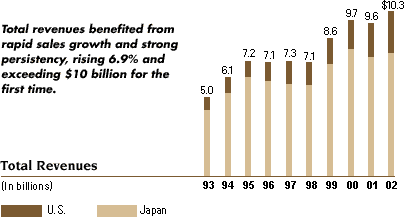 |

In addition to our efforts at broadening our product line, we also worked hard to expand our distribution system. We recruited approximately 3,500 new sales agencies in 2002, surpassing our goal of 3,000 new agencies. Many of our new sales agencies are individual associates who focus on selling to individual customers and small businesses. Those individual agents are better able to tap into the huge market of small and medium-sized businesses in Japan.
Another element in our distribution system is our successful alliance with Dai-ichi Mutual Life Insurance Co., which sells our cancer product. Dai-ichi Life, with 50,000 sales associates, is the second largest insurance company in Japan in terms of total assets. Dai-ichi Life's desire to sell our product rather than developing one of its own is, in effect, an endorsement of AFLAC. And its success at selling 21st Century Cancer Life also demonstrates the strong demand for cancer products in Japan.

 
We have also transitioned the leadership of AFLAC Japan. On January 1, 2003, we promoted Deputy President Charles Lake to president of AFLAC Japan. Charles, along with Allan O'Bryant, who serves as AFLAC International president and deputy CFO of AFLAC Incorporated, Atsushi Yagai, director of marketing and sales, and Hiroshi Yamauchi, director of operations, provide us with a talented group of managers to lead us forward. Their abilities, combined with the experience of AFLAC Japan Chairman Hidefumi Matsui, who was promoted to that position on January 1, 2003, give us a great balance of first- and secondgeneration leaders. Yoshiki "Paul" Otake, who retired in January 2003 as chairman of AFLAC Japan, will continue to assist us as executive advisor. Paul was AFLAC Japan's first employee, and he played a crucial role in spearheading our entry into the Japanese insurance market and securing our operating license there in the early 1970s. We are very grateful for his many years of leadership and dedication to our business.
In December, a formal proposal regarding funding for Japan's life insurance policyholder protection fund was submitted to members of the Life Insurance Policyholder Protection Corporation (LIPPC). The proposal called for an extension of the Japanese government's pledge to enact fiscal measures of up to ¥400 billion until March 31, 2006, and for the industry to contribute an additional ¥78 billion to the LIPPC. Despite votes against the proposal by AFLAC and some other companies, it was passed by the LIPPC on December 27, 2002. Passage of the proposal resulted in an after-tax charge of $26 million for our estimated portion of the additional industry contribution.
Although we commend the government for its decision to extend its financial commitment to the protection fund, we are deeply disappointed in its request for additional contributions from the life insurance industry. We believe the industry has already done more than its share. And companies like AFLAC, which have conservatively managed their business to ensure financial strength, should not be penalized. Nevertheless, we are encouraged by the government's commitment to conduct a thorough review of its current safety-net system in order to establish a more efficient, sustainable system for the benefit of the life insurance industry and its policyholders. Despite our displeasure with the recent industry assessment, we continue to view Japan as a vast and desirable market for affordable supplemental insurance products, and we believe that AFLAC is in the best position to capitalize on that opportunity.

|
 |